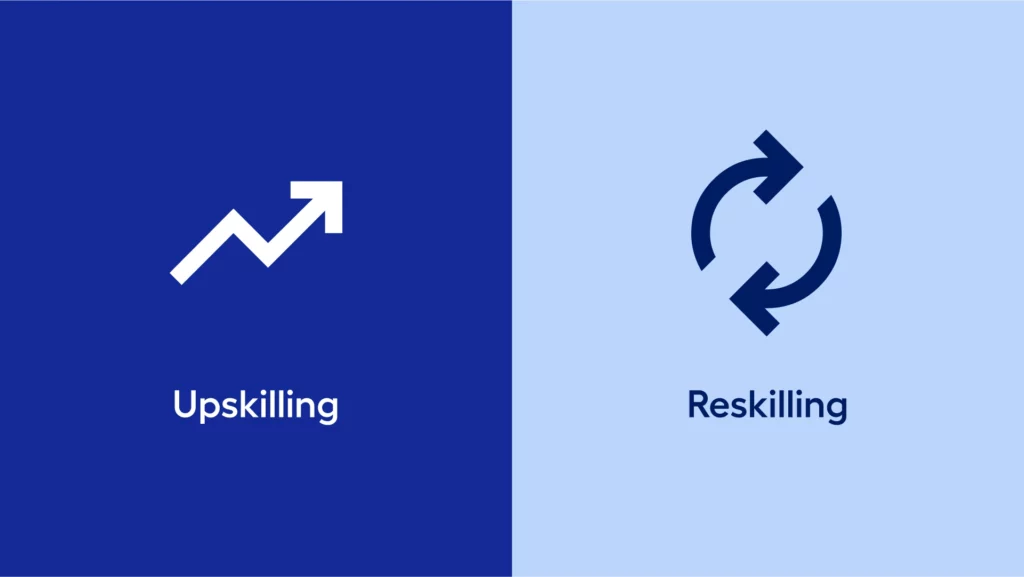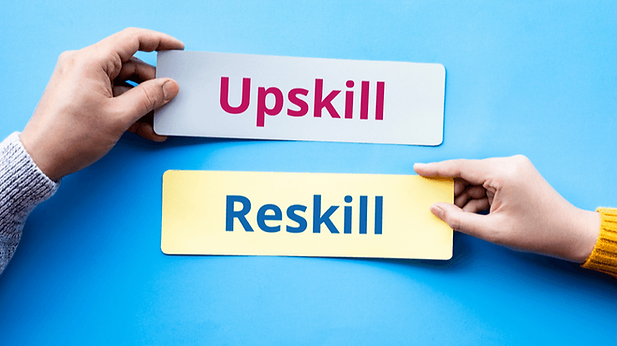
As technology surges forward and industry demands constantly shift, digital proficiency isn’t just an advantage—it’s a necessity. Amid this dynamic landscape, the buzzwords “upskilling” and “reskilling” have become career-defining strategies. But what do they mean, and how do you decide which path to take? Understanding these approaches could be the game-changer in your quest to thrive in today’s fast-paced professional world.
This article delves into the nuances of upskilling and reskilling, offering insights to help you make an informed decision.
Understanding Upskilling and Reskilling
Upskilling: Enhancing Existing Skills
Upskilling refers to acquiring or enhancing new competencies within the same job or industry. This approach focuses on deepening your expertise, allowing you to stay current with the latest advancements and methodologies.
For instance, a software developer learning a new programming language or an HR professional gaining proficiency in advanced data analytics are examples of upskilling.
Benefits of Upskilling:
- Increased Efficiency: By refining your current skills, you can perform your job more effectively and efficiently.
- Career Advancement: Upskilling can open doors to promotions and leadership roles within your current organization.
- Job Security: Staying updated with industry trends and technologies ensures your relevance in your field.
Read: The Must-Have Skills of 2024 for Professionals
Reskilling: Acquiring New Skills for a Different Role
Reskilling involves learning new skills to transition into a different role or industry. This approach is often necessitated by changes in the job market, such as automation or the decline of certain sectors.
For example, a factory worker learning coding to become a web developer or a retail manager transitioning into digital marketing are instances of reskilling.
Benefits of Reskilling:
- Career Flexibility: Reskilling allows you to shift careers, especially if your current industry is facing a downturn.
- Broader Opportunities: Acquiring new skills can open up a wider range of job opportunities in various sectors.
- Adaptability: Reskilling fosters adaptability, making you resilient to market changes and future-proofing your career.
Factors to Consider When Choosing Between Upskilling and Reskilling

Career Goals and Aspirations
Your long-term career goals are crucial in deciding whether to upskill or reskill. If you are passionate about your current field and see growth potential, upskilling might be the right choice. Conversely, reskilling could be more suitable if you seek a complete career overhaul or are drawn to a different industry.
Industry Trends and Job Market
Understanding industry trends and the job market landscape is essential. If your industry rapidly evolves with new technologies and practices, upskilling can help you stay competitive. However, if your industry is shrinking or being disrupted by automation, reskilling can provide a pathway to more stable and emerging fields.
Personal Interests and Strengths
Consider your personal interests and strengths. Upskilling allows you to build on your existing knowledge and leverage your experience. Reskilling, on the other hand, offers an opportunity to explore new areas that might align better with your passions and talents.
Time and Financial Investment
Both upskilling and reskilling require time and financial investment. Upskilling might be less intensive as it builds on your existing foundation. Reskilling, however, might demand a more significant investment in terms of learning new concepts from scratch and potentially pursuing new certifications or degrees.
Strategies for Effective Upskilling

Continuous Learning and Development
Embrace a mindset of continuous learning. Attend workshops, webinars, and conferences related to your field. Enroll in online courses and certification programs to stay updated with the latest trends and technologies.
Networking and Mentorship
Leverage your professional network to gain insights and guidance. Seek mentors who can provide valuable advice and help you navigate your career path. Engaging with industry peers can also open up opportunities for collaboration and growth.
Hands-On Experience
Practical experience is crucial for effective upskilling. Take on challenging projects at work, volunteer for cross-functional teams, or pursue freelance opportunities to apply your skills in real-world scenarios.
Read: Tips to Help You Learn New Skills
Strategies for Successful Reskilling
Identify Transferable Skills
Assess your current skill set to identify transferable skills that can be leveraged in a new role or industry. Communication, problem-solving, and project management are examples of skills that are valuable across various fields.
Explore Educational Opportunities
Consider enrolling in formal education programs, such as degree courses or bootcamps, that provide comprehensive training in your desired field. Many institutions offer flexible online programs tailored for working professionals.
Gain Practical Experience
Seek internships, part-time roles, or volunteer positions in your target industry to gain hands-on experience. Practical exposure can significantly enhance your resume and build your confidence in a new field.
In 2024, choosing between upskilling and reskilling depends on your career goals, industry dynamics, personal interests, and learning investment. Upskilling boosts expertise and job security, while reskilling offers flexibility in a changing market. Evaluate your options to make an informed decision that aligns with your aspirations.
The key to a successful career is continuous learning and adaptability. Whether you upskill or reskill, embracing change and staying proactive in your development will keep you ahead of the curve.
